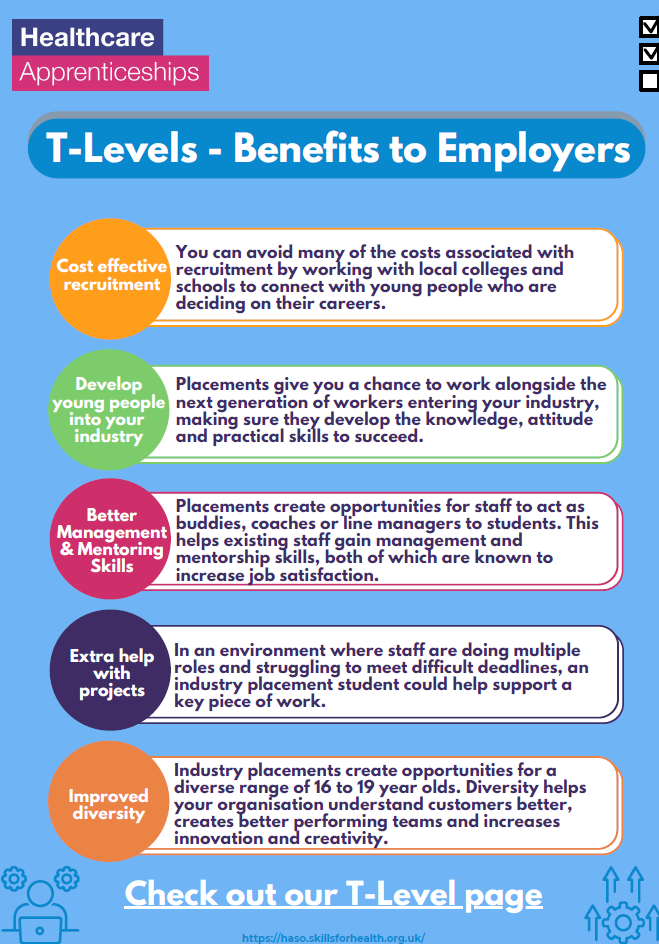What is a T Level?
T Levels are new two-year courses which are taken after GCSEs and are broadly equivalent in size to three A Levels. These courses have been developed in collaboration with employers and education providers so the content meets the needs of industry and prepares students for entry into skilled employment, an apprenticeship or related technical study through further or higher education.
T Levels offer students practical and knowledge-based learning at a school or college and on-the-job experience through an industry placement of at least 315 hours – approximately 45 days.
The courses are available at selected colleges, schools and other providers across England.
T Level providers in Kent and Medway as of February 2024 are EKC Group, Leigh Academy Trust, Mid Kent College, North Kent College, St George’s Church of England School, The Canterbury Academy, The Sittingbourne School, and Westlands School.
T Level programmes will provide students with:
- broad knowledge, skills and behaviours necessary for employment in an occupation or industry related to their field of study
- an opportunity to develop specialist technical skills relevant to at least one occupation
- relevant maths, English and digital skills.
T Levels will also provide a progression pathway to skilled employment, higher or degree-level apprenticeships and higher-level education.
For those not ready to go directly on to a level three T Level qualification, a transition programme will be available. Find out more about the transition programme.
Programme structure
T Levels require students to carry out both a technical qualification and an industry placement with an employer.
Students are also required to work towards the attainment of maths and English if they have not already achieved grade 4 at GCSE. Students studying T Levels are no longer required to achieve either a grade 4 in English and maths GCSE or level 2 in functional skills to pass their programme.
T Levels will be worth UCAS points (a T Level Distinction* is worth the same as 3 A levels at A*) and will be recognised by universities and other education providers see the universities accepting T Levels.
Key information for health and care employers and education providers
Industry placements
Industry placements are a shift from traditional work experience to a longer, more structured placement in the workplace for young people to develop real work skills and make a meaningful contribution to your organisation. Placements are 20 per cent of the T Level course and will last at least 315 hours (approx. 45 days), where they put the skills learned in the classroom into action.
Industry placement models
There are three typical models for placements: Day release, block and mixed. As long as the total time for each industry placement adds up to approximately 45 days, you can adapt the models to suit your business needs, and to align with the student’s course. The placement model will be agreed between you, the school or college, and the student.
Who can offer industry placements?
Any employer in England, can offer an industry placement to a T Level student.
Industry placements must take place in a work environment, so it's a good idea to offer placements via a T Level school or college that's close to your organisation's premises.
Before you offer a placement, you should make sure you're happy with your responsibilities as an employer.
Benefits of taking on T levels students on placement

How to offer an industry placement
How to offer an industry placement?
Several Kent and Medway health and social care organisations are already working with local schools and colleges to offer T Level industry placements. Find out more about how industry placements work
If you're interested in offering an industry placement, your first step is to contact your local school or college.
Support for employers and education providers
If you are a health or care provider who is interested in having T Level student placements, this CPD module can offer useful information about how to manage this within your organisation.
If you are an education provider who is interested in delivering T Levels, this CPD module contains useful information about how to get started. It can also support with the delivery of the health T Level curriculum, and enable you to support your students with their career choices with up-to-date information about healthcare careers structures.
If you need more information or support with delivering T Levels with placements in health or care settings, the academy team is always available for support. Use the get in touch button at the bottom of the page to contact us.
T Levels – the next level qualification for our future workforce
Watch these videos, made in partnership with East Kent College Group, to get an understanding and hear the benefits of how T level industry placements work for the student, employer and education provider.
- East Kent Colleges and the East Kent Hospitals University NHS Foundation Trust’s Nursing Education Team are working together on T Level placements in nursing profession.
- NHS Kent and Medway’s Children and Young People’s Mental Health is working on T Level placements in business.
Filming was at NHS Kent and Medway office in Whitstable, Kent and Canterbury Hospital and Canterbury College.
Resources
Visit T Levels website where you can add your postcode to find colleges, schools or other providers who are offering T Levels. You can also find guidance at the Get the Jump content hub.
Watch our industry placement videos to hear from students and employers who have benefited from industry placements.
T Level professional development offer, led by the Education and Training Foundation (ETF) has been available since May 2019 at no charge to providers delivering or planning to deliver T Levels, and will continue to publicise training and CPD via their newsletter and website.
DfE’s employer engagement teams work with employers of all sizes and providers on industry placements. To find out more about industry placements email tlevel.placement@education.gov.uk or visit T Levels and industry placement support for employers.
Frequently asked questions
Are T Levels the same as apprenticeships?
T Levels differ from an apprenticeship. T Levels prepare students for work, further training or further study. An apprenticeship is typically 80 per cent on-the-job and 20 per cent in the classroom and is more suited to those who want to earn a wage and learn at the same time, and are ready to enter the workforce at age 16.
How much does it cost the employer?
T Level industry placements are a free government scheme. Employers don't need to pay to take on a T Level student for a placement. Employers can choose to pay the student if they wish. Employers should also invest in planning, training and supervision of the student.
More answers to FAQs can be found on the NHS Employers website

